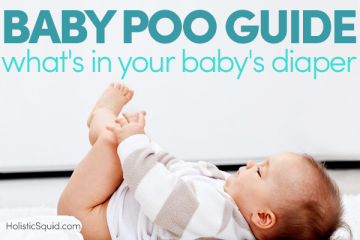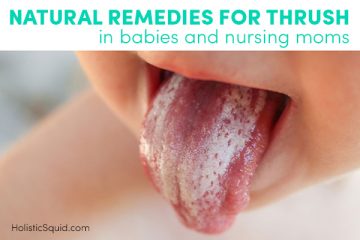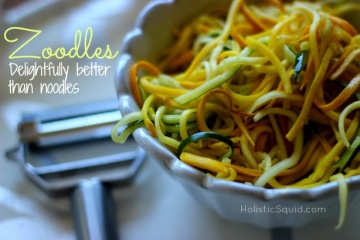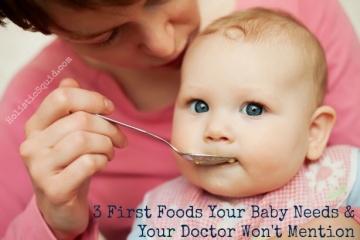
“It's just colic.” Anyone who's uttered these words clearly has not experienced the exquisite wails of a baby who seems inconsolable for days on end.
Usually from a medical perspective, there's nothing going on other than a screaming baby that may or may not have an upset tummy and doesn't want to be put down. The extreme fussiness lasts for a few months, tops, and it may get better if you eliminate nearly every tasty food a nursing mom might crave.
In the meantime, the screams drive already sleep-deprived parents to a new level of bleary-eyed exhaustion and worry. In less extreme cases your baby may have gas that doesn't pass, tons of spit up, and varying degrees of associated discomfort.
While I can only imagine how hard it must be for your little one, moms and dads, I feel your pain.
But never fear…Solutions abound in the form of safe, natural remedies for colic and reflux that are often very effective.
Natural remedies for colic and reflux
#1 – Diet
For breastfeeding babes one of the first places to look to cure colic may be mom's diet: Possible culprits include: brassica family (broccoli, cabbage, kale), allium family (onions, garlic), caffeine, spices, beans (including soy products), dairy, and chocolate. (Sorry, moms!)
Also, for babies with reflux, mom should avoid mint tea which can exacerbate the situation.
For babies on breast milk substitutes, addressing “diet” issues may be slightly trickier because dairy and soy, the usual chief ingredients of formula, can cause tummy upset. “Pre-digested” formula (also called protein hydrolysate) may be easier to digest. It is made from cow's milk that has been specially treated to break down the protein into smaller, more digestible units.
While predigested protein may be necessary for some babies, its processed nature is not ideal. For newborns taking formula (even if not exclusive) it's a good idea to add baby probiotics to their bottles to keep a good balance of healthy bacteria in baby's gut.
Click here for my favorite baby probiotic.
2 – Nursing schedule
Is your baby having green frothy poos?
Is he gaining weight, having lots of pee diapers, and (other than screaming and looking uncomfortable) generally thriving?
If so your baby's colic may be a case of over supply/forceful letdown and/or a foremilk/hindmilk imbalance – which can come as a huge relief for new mom's trying to eliminate everything tasty from their diets.
If baby's getting too much watery, sugary foremilk and not enough fat-rich hindmilk, the tell-tale signs of colic may result. The treatment strategies for this situation aim at getting baby's milk consumption in proper proportions. A options to try:
- Have baby nurse from the same breast for 3 feedings in a row, then switch. Express just enough milk from the opposite breast to relieve any discomfort. This method will also address oversupply over a few days.
- At feeding time have baby start nursing until you feel milk let-down. Then remove baby from breast and pump until you see foremilk change to hindmilk, then allow baby to relatch.
- Completely pump one breast to “empty” then allow baby to feed from that same side. The idea is that the less “full” a breast, the less foremilk baby will consume. Do the same on the other side for the next feeding.
In some cases, green mucus filled poo can be a sign of a food sensitivity if baby is breastfed.
While this usually resolves by the time baby reaches twelve months old, you can support baby gut health by getting rid of major potential triggers. The biggest culprits are cow's milk and soy. Other potential triggers in mom's diet include rice, corn, and eggs.
3 – Acupuncture and herbs
Traditional Chinese Medicine (TCM) can be extremely effective in treating colic.
TCM call colic conditions “night crying” due to the common pattern of baby getting inconsolably upset from late afternoon onward. From the perspective of this medicine, all children's digestive systems are underdeveloped to some degree until the age of six.
Colic is a result of this sensitivity. With or without overfeeding or consuming foods too difficult to digest, your baby may have colic.
TCM treatment will vary depending on your baby's constitution and his specific symptoms, but usually will almost always include dietary alterations for baby and breastfeeding moms in addition to acupuncture or herbal medicine.
For a great article that describes colic from a Chinese medicine perspective, click here.
4 – Probiotics
You may already get plenty of probiotic in yogurt, but the strains specific to healthy breastfed babies are under the umbrella Bifidobacteria.
Typically, probiotics contain a blend of Bifidobacteria along with Lactobacillus, which help to tone baby's immune system.
I recommend a dairy free probiotic mixed into baby's bottle or breast milk. This is the one I use in my practice.
5 – Homeopathy
I recommend Colic Calm, a great product akin to gripe water, that contains multiple homeopathic remedies to be sure you have the right one.
Colic Calm often does the trick or it will at least takes the edge off for colic, gas, and acid reflux.
Note: Expect black poos. The primary ingredient is vegetable charcoal which is said to pass through the digestive tract absorbing toxins along the way.
6 – Cranial sacral therapy (CST)
A gentle and highly effective treatment process, it can help identify and relieve any nerve blockages even while the baby is asleep.
Pressure sustained during birth may cause the main nerve of the digestive system to spasm, one of the creators of Colic. CST can release the blockage gently and heap relief on the child, all with the gentle touches of a practitioner.
7 – The “5 S's”
Dr. Harvey Karp outlines these simple tools for soothing baby's cries in his book, The Happiest Baby on the Block.
Swaddling, side-position, shushing, swinging, and sucking may seem like common sense, but are sometimes forgotten in the haze of carrying a colicky baby around in the middle of night.
If you need them, the 5 S's can work a charm on your little one.
Still crying?
Finally, good ol' movement can be one of the best ways to calm those cries.
For some babies it's rocking or bouncing, for others a long cruise in the car.
And if all else fails, take comfort in knowing that those midnight drives won't last more than a few months. Colic will magically go away when baby is 3-4 months old, giving you a much needed break before teething begins!
When to call an MD
If your baby is spitting up excessively and has significantly less pee diapers than usual and/or a fever, call your pediatrician to be sure to avoid dehydration.
What's your best advice on natural remedies for colic and reflux? Let me know in the comments!












My son was “colic” for 5 months, crying for 10-18 hours a day. He had reflux which was caused by his lip and tongue tie. I also had a very bad labour and as a result he had issues with his neck., which was address by CST. He had both a wheat and dairy allergy. You spoke about diet above and mentioned broccoli, onions and gassy foods. I was told by numerous breast feeding experts and lactation consultations this is not true. It might be possible that a particular food cause a child to be gasy but just because a food makes us gassy as adults does not mean it up will make them gassy. I hate when people have negative feedback on these sort of things but “colic” is a very sensitive topic for me. I had so many people tell me what I was eating was causing my sons colic and not allowing me to eat gassy foods and literally taking it away from me, going months without eating these foods and not making a difference during a very stressful time.. I think the first part of this was written poorly and gives misinformation and should be revised. For the rest of the document, thank you and I hope it helps other parents and children having to go though this to get some relief. No child should have to go though this. I kept being told by numerous doctors my son was just “colic” and to wait it out, if I had done this I have no doubts he would be colic today at 15 months.
Hi Marsha – Thanks for your comment. Food elimination can be so difficult – especially for nursing moms – but the types of foods that create tummy upset for babies truly varies so much from mother to mother. And, as you point out, it’s not even always the mom’s food that’s the problem.
When I see colicky babies in my practice, I typically have moms eliminate only the likely food triggers first. Occasionally though, I have had babies who were sensitive to brassicas, garlic, and onion, etc.
I just spent several days staying with my friend and her newborn twins, offering support and fresh home cooking! The smaller of the two babies is experiencing distressing colic. We found some good strategies to help, and I just sent her this article and recommended she look into probiotics. As the family is also working to address some diaper rash, probiotics may prove helpful.
My friend is doing her very best to pump, but having a hard time producing much breast milk. The babies are drinking primarily formula. One strategy that helped us this week was to pause feeding after every ounce or so for a quick “burp break” before resuming feeding. Another strategy (not during feeding, but while baby is still awake afterward) is to use a gentle, warm hand moving on the belly in a circular motion, following the path of digestion. A nice long tummy rub session results in a softer, happier belly and a much better sleep.
We also tried mixing up different burping techniques – the stroke up the back, the pat on the back while on the shoulder, the dance around the room with baby on shoulder doing pats and rubs on the back. We found that sometimes, if we worked at it long enough, we produced a burp we didn’t know was hiding in there and it sometimes helped prevent colic from striking later. This helped with both babies, not just the one with more distress but also her brother. Strategies worth trying out!
Both of my boys were colicky babies, but I didn’t know much about treatment for it with my first and just suffered through it. With my second I learned about Lactobacillus reuteri and how it can help with colic. I started it about 2 weeks after he became colicky and within a few days he was a completely different baby! It was AMAZING! If we ever have another baby I am going to make sure to have those probiotics on hand!
Curiosity question – my diet wasn’t great with either pregnancy. I didn’t really get into the real food lifestyle until after my youngest was born. Do you think the prenatal diet affects whether or not a baby will be colicky? I wonder, whenever I’m pregnant again if eating more probiotic rich foods during pregnancy will help curb colic in that baby? Any ideas if that will help at all? I’d love to not have a colicky baby next time!
Hi Christina – yes, I absolutely think prenatal diet is an important factor in colic and babies’ overall health.
Bio Gaia probiotic drops are magic!!! Works even better than Ovol. Good luck!
Hello my problem was my son seven months old had severe cough so I had given him halopathy medicine so he started having loose stools so I gave him ayurvedic medicine to stop from diarea but thecproblem is that he is having white sticky poop what tovdo
I was using Klaire Labs infant formula but they don’t include L. Reuteri in their formulation bc they cannot find a dairy free, gluten free source. So I added Gerber Soothe – which is only L. Reuteri
I had cut out dairy for 5 weeks and have seen no difference. I cut out kombucha, wheat, soy, brassica veggies, eggs, beans…. Then I had a vega test for food sensitivity and found I was sensitive to oats, wheat, almonds, coconut, bananas and night shades. Basically I cannot eat ANY of my favorite foods (really struggling with coconut and bananas – this is even though I experience no symptoms). But two days ago I realized I have been taken Fermented Cod Liver with Butter Oil, this whole time – do you think that is sufficient dairy to cause an issue? I stopped taking it – how long for it to get out of my system?
Would LOVE your insight. Please.
Hi Michele – Thanks for your comment. I totally understand how challenging this can be! If you didn’t come up sensitive to dairy on the test, it should be fine. To be safe, you can stop for awhile, and try introducing it again later on.
My little one loves his Zipadee-Zip from Sleeping Baby. My LO loves the breathable, soft-fleece material that it’s made of and it soothes and comforts him. Our “going to sleep” process usually includes a little massage with lavender essential oil while my white noise sound app is in the background of his crib. This usually does the trick to get him to stop crying and sleep.
I appreciate this post so much! In fact I cut out various foods from my sons diet like milk, and changed up some of the veggies he ate to reduce bloating. I have taking so many approaches to relieving my sons colick (and my ears!). Like PrissyMA310 above I too did get relief by using the Zipadee-Zip and I noticed that he falls asleep within 20 minutes when I place him in it. It used to take about an hour for him to be still. I appreciate all this advice 🙂
I took several remedies such as using a sleeping baby sack called the Zipadee-Zip, white noise machines, essential oils, and simply just cuddling my son. We aslo overhauled his diet in hopes that that would work, Sleep eventually became the best option and Im glad that the Zipadee-Zip really does work.
When my baby was colicky, my husband and I tried so many different things. Eventually there were some dietary changes, ear plugs for us, some medicine and a Zipadee-Zip that eased things. What has worked for everyone else?
LO was suffering from colic since his birth time and wasn’t getting settled with any remedy. I used colic drops, Karo syrup and many more but the final remedy which worked was babies magic tea. The tea is ultimately herbal and natural so safe for newborns and also soothes instantly.